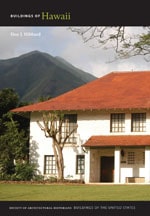
An enormous porte-cochere with a green tile roof commandingly asserts itself as a grand initial impression for the golf club's otherwise demure facade. Beyond the porte-cochere, the clubhouse successfully disguises its sixty-thousand-square-foot volume by placing one story below grade and serrating the other into a series of interlocking, square, hipped-roof pavilions. The central lobby offers a series of bold gestures, fulfilling the promise of the porte-cochere. Front and rear convex window walls establish a transparency, dramatized by the two-story-high rear window wall dissolving into a panorama of the verdant, rolling contours of the Robert Trent Jones Jr.–designed golf course. Green marble contributes a luster to the semi-hexagonal space, and an enveloping pool and fountains at the foot of the grand staircase add a note of tranquility. The wings off each side of the entrance accommodate a pro shop and spa, as well as meeting and banquet facilities. A first-floor restaurant and bar, with expansive segmental-arched windows, provides views of the surrounding greenery. The clubhouse's architect, Desmond Brooks, worked for Media Five in Honolulu prior to relocating to Australia.














